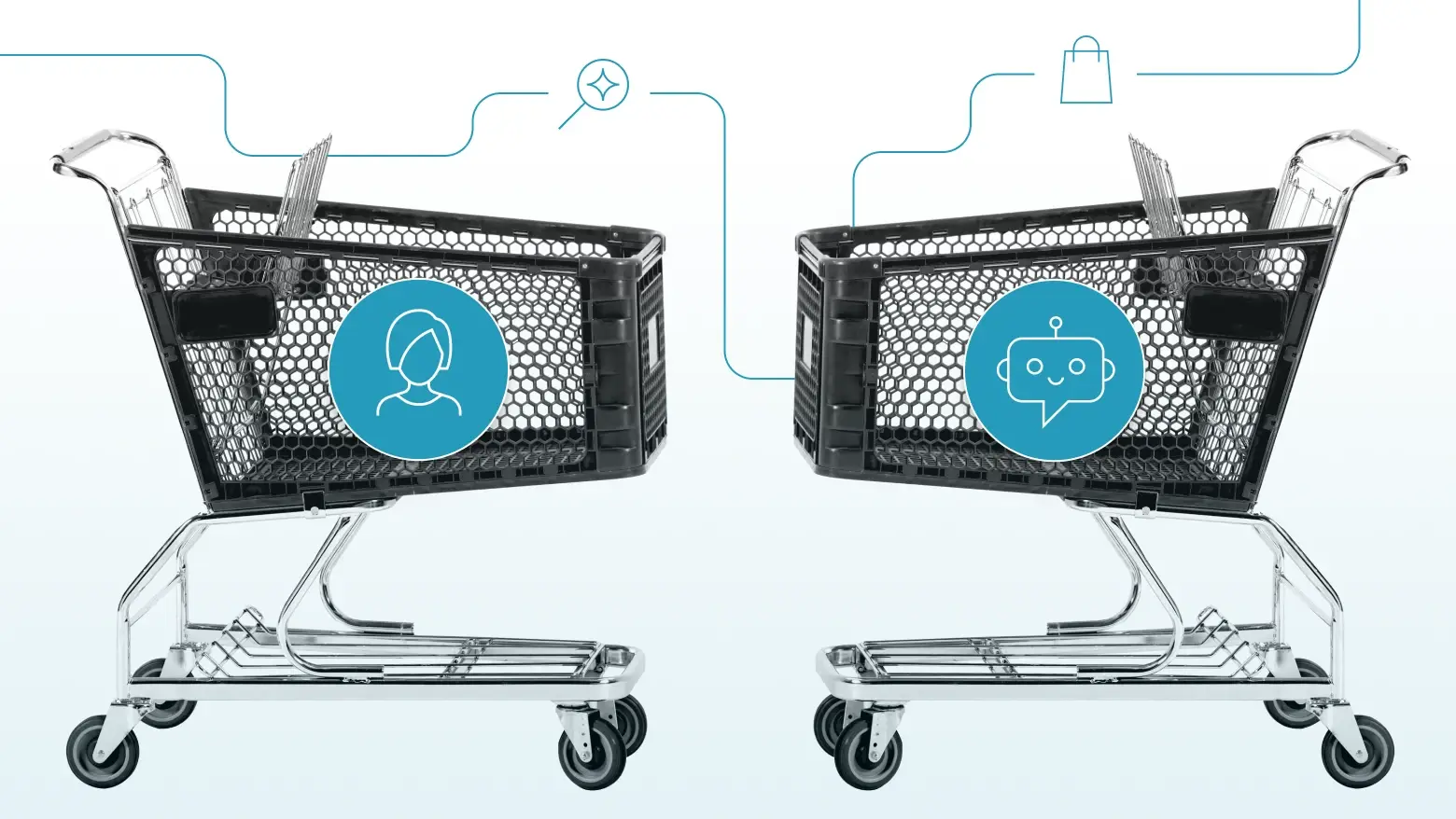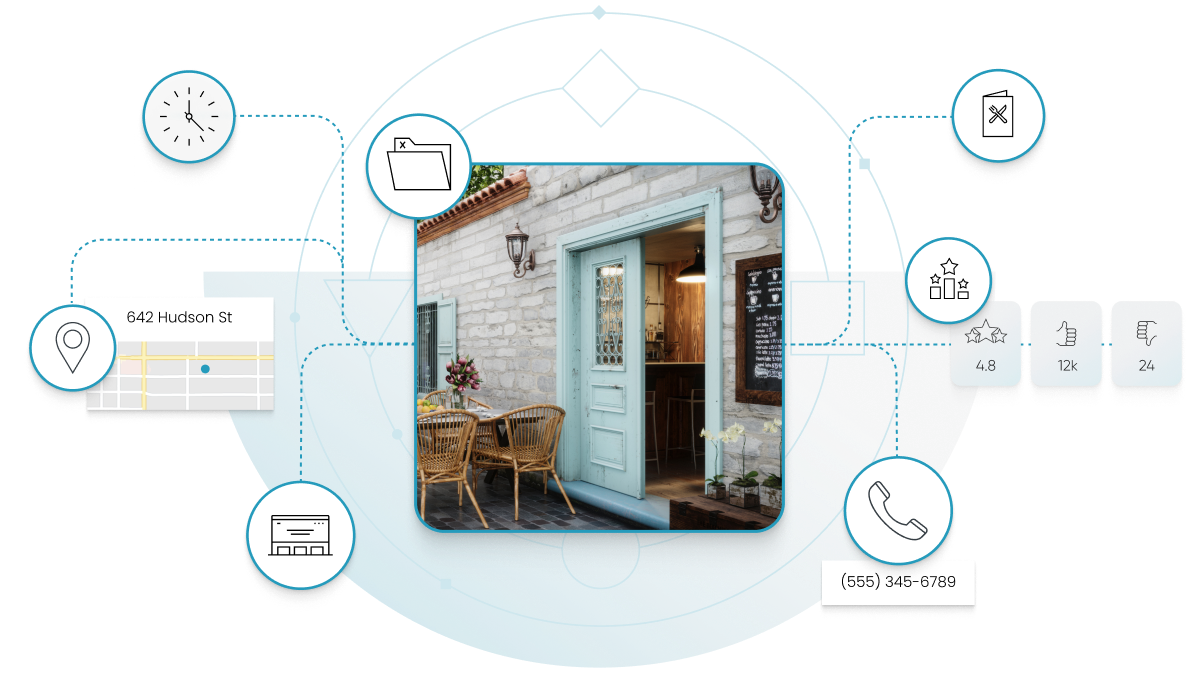Your Customer Isn’t the Only One Shopping: How AI Agents Are Changing Search and Discovery
If AI can't find your brand, how will customers? Find out how structured data and knowledge graphs can help your brand surface in AI search results, so every conversation can drive conversions.
Jun 2, 2025

Is AI taking over the customer journey?
AI agents aren't just changing how we search. They're changing how we shop.
Think it's all hype? That mindset is already holding you back.
Platforms like Alexa, Perplexity, and ChatGPT (on the heels of dropping its sign-in requirement) are already shopping on behalf of customers. They're recommending products, comparing options, and completing transactions. Google is up next. Meanwhile, financial giants like Visa are innovating with AI-ready payment tools or cards, AI-driven personalization data, and agentic checkout systems.
Why should you care?
Customers can, will, and do buy from brands without ever visiting your site.
So, how do you make sure you make it into their carts?
Structured data is the new digital storefront
With AI agents skipping past your website and jumping with customers straight to purchase-ready answers, the real question becomes, how do you make sure your brand gets recommended in the first place?
The answer? Start by investing in structured data.
Here's why: AI search doesn't work like traditional search. It doesn't crawl indexed pages, rank links, and hope for a click. Instead, AI models pull from billions of real-time data points to generate a direct answer. It behaves like it's the authority. And it's structured data that informs its authority and guides those answers.
Every detail about your brand — from hours and inventory to reviews and product specs — needs to be structured, accurate, and machine-readable. If it's not, AI can't find it. And if AI can't find it, your customer never sees it.
Remember, when AI agents skip past your website, they're not giving up their search. They're still seeking the data they need to match their customers' intentions.
And this is where a knowledge graph comes in.
Your knowledge graph is the backbone of your structured data strategy — the system that organizes your information so AI agents can read, trust, and act on it. That's why structured data is now your most important digital storefront.
Put simply, AI speaks structured data. Your knowledge graph is the translator.
Your Knowledge Graph is no longer a backend asset — it's a sales driver
Picture this: you're 15 and shopping for your first razor.
Instead of searching Google for "best razors for sensitive skin" or "earth-friendly razors" and clicking through links to read reviews, you ask Perplexity.
The agent doesn't give you 10 blue links you have to click through. Instead of sending you to Amazon or the brand's website, the AI agent compares options, summarizes product features, checks reviews, and recommends the top choice. One tap or voice confirmation later? Your purchase is complete and headed to your door.
No site visit. No browsing. No traditional search result.
This is the future of AI-driven commerce. AI agents don't just retrieve information. They act on it. And what enables that action? A knowledge graph powered by structured data. It's the engine that organizes, connects, and distributes structured data across the web, making your brand discoverable to AI and actionable to customers.
If your data isn't structured and stored in a system built for AI, like a knowledge graph, you're out of the conversation. And if you're out of the conversation, you're out of the conversion.

Which industries are most impacted by AI agents as personal shoppers?
Industries like retail, food service, and healthcare are already feeling the effects. But, AI agents are coming for travel, hospitality, finance... really, all verticals are next.
Christian J. Ward, Chief Data Officer at Yext puts it simply,
"Whether you're ready for it or not, the most dominant traffic coming to your website within the next 18 months will be agents, not humans. Those AI agents will be working on behalf of humans, but far fewer customers will visit your site."
Ward continues,
*"Retail, healthcare, financial services — all of these customer journeys are going to start leveraging agentic AI. It's really just going to come down to which brands hook it up faster and make it easier for AI tools to use." *
▶️Curious to hear what else Ward's predicting? Stream "Agentic AI on the Rise" *on demand.*
AI strategy = data strategy = content strategy
If AI agents are the new interface, data is the fuel, and content is the delivery mechanism.
Your digital presence can't simply inspire and inform. It must convert.
To show up in AI search and assist agents in taking action, digital marketers need to make content easy for AI agents to find, interpret, and use. Not just once, but everywhere it lives: listings, reviews, social posts, local pages, and across publisher networks.
As Christian J. Ward, Chief Data Officer at Yext, advises,
"If an agent fails to get the information it needs from your business to answer a customer or patient's questions, the agent is going to remember that — and it's not coming back to your content."
AI search platforms don't index your site and hope for a click. They read your structured data, interpret it, and generate answers (or actions via agents) on the spot.
But data alone isn't enough. The content that wraps around that data — FAQs, descriptions, policies, responses, reviews — is what gives AI the context to recommend you.
So if you want to show up when someone asks their preferred AI agent, "Can you make me a reservation at a spot with outdoor seating that serves lunch until 3?" it's the structured data that gets you seen — and the content that gets you picked.
Learn how Scout can help AI search agents (and human customers) find you first.
Scout gives you a real-time view of your brand's visibility and sentiment across AI search platforms like ChatGPT, Gemini, Perplexity, and Grok, as well as traditional search engines like Google. It benchmarks your visibility and sentiment against competitors — and shows you what to do next.
No guesswork. No disconnected tools. Just clear answers, prioritized actions, and measurable impact.
See what's working (and fix what's not) with Yext Scout.